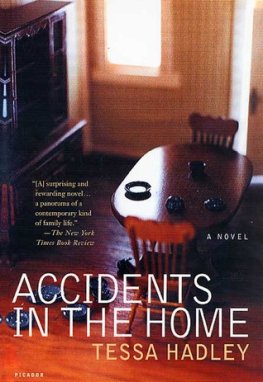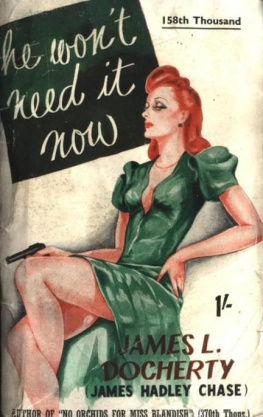Acknowledgements
Thanks to Richard Kerridge, whose judgement mattered, and to Alice Bradley and Liz Porter, whose help with certain details was invaluable. The library building is based on a real library in Cardiff, but the staff are entirely imaginary. Thanks to Bath Spa University for teaching relief, and to Academi for a writers bursary; these gave me precious time and freedom to work on the novel. Thanks of course, for everything, to Dan Franklin and Caroline Dawnay.
Also by Tessa Hadley
ACCIDENTS IN THE HOME
EVERYTHING WILL BE ALL RIGHT
SUNSTROKE AND OTHER STORIES
THE MASTER BEDROOM
I
B y the time Paul got to the Home, the undertakers had already removed his mothers body. He protested at this, it seemed done in indecent haste. He had set out as soon as they telephoned him; surely they could have waited the three or four hours it had taken him to get there (the traffic had been heavy on the M5). Mrs Phipps, the owner of the Home, guided him into her office, where whatever scene he might make wouldnt upset the other residents. She was petite, vivacious, brown-skinned, with traces of a South African accent; he didnt dislike her, he thought she ran the Home to a good standard of care, his mother had seemed to resign herself gratefully to her efficiency and brisk baby-talk. Even at this moment, however, there was no sign that the taut, bright mask of Mrs Phippss good humour, respectfully muted in the circumstances, ever gave way to any impulse of authentic feeling. Her room was pleasant; an open sash window let in the afternoon spring sunshine from the garden. On the wall behind her desk was pinned a colourful year planner, almost every square scribbled over with busyness and responsibility: he imagined a space on the planner where his mothers occupation of her room abutted abruptly onto blankness.
If he wanted to see his mother, Mrs Phipps said, putting the right nuance of sorrowful tact into her voice, she could telephone the undertakers, he could go to see her there. Paul was aware of the hours ahead as requiring scrupulous vigilance; he must be so careful to do the right thing, but it wasnt clear what the right thing might be. He said he would take the undertakers address and number, and Mrs Phipps gave it to him.
I ought to let you know, she added because I wouldnt want you to find out in any roundabout way, that Evelyn made another of her bids for freedom last night.
Bids for freedom?
He thought that she was using an odd euphemism for dying, but she went on to explain that his mother had got out of bed at some point in the evening, and gone into the garden in her nightdress. There was a place they always looked when they couldnt find her: Evelyns little den in the shrubbery.
Im sorry that it happened. But I did warn you that we simply arent able to provide twenty-four-hour supervision of residents when they fall ill. The girls were in and out of her room all evening, checking on her. That was how we realised she had got out. To be frank with you, she was so weak none of us had imagined she was even capable of getting out of bed. She can only have been out there for ten to fifteen minutes before we found her. Twenty at the most.
They had brought her inside and put her back to bed. She had had a good night; she only deteriorated after breakfast this morning.
Mrs Phipps was worrying that he might make a complaint, Paul realised.
Its all right. If thats what she wanted to do, then Im glad she was able to get out.
She was relieved, although she didnt understand his point. Of course we were worried about her body temperature, these spring nights are treacherous. We wrapped her up warmly and made her a hot drink, we kept an eye on her all through the night.
Paul asked if he could sit in his mothers room for a while. They had already stripped her bed and pulled up over the mattress a clean counterpane in the standard flowered material that was everywhere in the Home: there were no signs he could see of what had taken place in here. Mrs Phipps had reassured him that his mother had gone very peacefully, but he took this as no more than a form of words. He sat for a while in his mothers armchair, looking round at her things: the last condensed residue of the possessions that had accompanied her from her home to her small flat in sheltered accommodation and then to this room. He recognised some of them only because he had moved them for her each time; others were familiar from his childhood and youth: a majolica fruit bowl, a blue glass girl who had once been fixed on the side of a vase for flowers, the red Formica coffee table that always stood beside her chair, with its built-in ashtray on a chrome stem.
When Paul left the Home, he drove to the undertakers and sat in his car in their small forecourt car park. He had to go inside and talk to them about arrangements for the funeral; but there was also the issue of seeing his mothers body. He was his parents only child. Evelyn had absorbed the brunt of his fathers death twenty years ago, when Paul was in his twenties: now all the lines met in him. Of course his wife would be sorry, and his children too; however, because for the last few years Evelyns mind had wandered farther and farther, she had become a distant figure to the girls, and he had only brought them to visit her every so often. She still recognised them, but if they went into the garden to play, or even if they went to the toilet, or moved round to the other side of her chair, she would forget she had already seen them; each time they returned she would greet them again, her face lighting up with the same delight.
His father had died in hospital after a heart attack; Evelyn was with him, Paul had been living in Paris at the time and had not arrived until the next day. The possibility of seeing the body had not arisen; in his concentration then on his mothers bereavement, it probably hadnt seemed important. Now he did not know whether this was important or not. He peered into the undertakers shop window with its kitsch discretion, urns and pleated silks and artificial flowers. When eventually he got out of his car to go inside, he realised it was past six oclock. There was a closed sign hanging on the shop door, with a number to contact in case of emergency, which he didnt write down. He would come back in the morning.
He had got into the habit of using the Travelodge, if ever he needed to stay overnight in Birmingham when he came to visit his mother; conveniently, there was one only ten minutes drive from the Home. He unpacked his few things, a clean shirt and socks, toothbrush, a notebook, the two books of poetry he was reviewing he had not known when he set out in the morning how long he would need to stay. Then he telephoned Elise.
Shed gone by the time I got there, he said.
Oh, poor Evelyn.
Mrs Phipps said she went very peacefully.
Oh, Paul. Im so sorry. Are you all right? Where are you? Do you need me to come up? Im sure I could get someone to have the girls.
He reassured her that he was all right. He didnt want to eat, but walked around the streets until he found a pub where he drank two pints, and browsed a copy of the Birmingham Mail that was lying on a table. His mind locked into the words, he read each page exhaustively, taking in without any inward commentary every least detail: crime, entertainment, in memoriam. He had a dread of being overtaken by some paroxysm of grief in a public place. Back in his room, he did not want to read either of the poetry books; when he had undressed he looked in the drawer of the bedside table for a Bible, but it was a New International Version, no good to him. He turned out the light and lay under the sheet, because the heating was stuffy and airless and you could not open the windows more than a crack. Through the crack the fine spring night sent its smells of greenness and growth, mingled with petrol fumes from the road outside that never stilled or grew quiet, however late it was. He was relieved, he thought. What had happened was merely the ordinary, expected, common thing: the death of an elderly parent, the release from a burden of care. He had not wanted her life prolonged, in the form it had taken recently. He had not visited her as often as he should. He had been bored, when he did visit.













